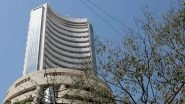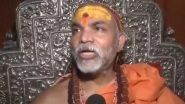Baghdad, May 17 (AP) Regional leaders were to meet in Baghdad on Saturday at the annual summit of the Arab League, with the war in Gaza expected to once again loom large.
In March, at an emergency summit in Cairo, Arab leaders endorsed a proposed plan for reconstruction of the Gaza Strip without displacing its roughly 2 million residents.
Saturday's summit comes two months after after Israel ended a ceasefire reached with the Hamas militant group in January. In recent days, Israel has launched widespread attacks in Gaza and Israeli Prime Minister Benjamin Netanyahu has vowed a further escalation of force to pursue his aim of destroying Hamas.
The Baghdad meeting was upstaged by US President Donald Trump's tour in the region earlier in the week. Trump's visit did not usher in a deal for a new ceasefire in Gaza as many had hoped, but he grabbed headlines by meeting with new Syrian President Ahmad al-Sharaa — who had once fought against US forces in Iraq — and promising to remove US sanctions imposed on Syria.
Al-Sharaa was not attending the summit in Baghdad, where Syria's delegation was headed by Foreign Minister Asaad al-Shibani. Iraqi Shiite militias and political factions are wary of al-Sharaa's past as a Sunni militant and had pushed back against his invitation to the summit.
Formerly known by the nom de guerre Abu Mohammed al-Golani, al-Sharaa joined the ranks of al-Qaida insurgents battling US forces in Iraq after the US-led invasion in 2003 to oust Saddam Hussein and still faces a warrant for his arrest on terrorism charges in Iraq.
During Syria's conflict that began in March 2011, several Iraqi Shiite militias fought alongside the forces of former Syrian President Bashar Assad, making al-Sharaa today a particularly sensitive figure for them.
Iraq, which has strong — and sometimes conflicting — ties with both the United States and Iran, has sought to strike a difficult balance between them and to position itself as a regional mediator.
An Iraqi political official, speaking on condition of anonymity because he was not authorized to comment, said that Iran's Quds Force commander Esmail Ghaani had paid a visit to Baghdad prior to the summit and “conveyed messages of support for the Iranian-American negotiations” for a nuclear deal and a demand for the lifting of crippling sanctions on Iran. (AP)
(The above story is verified and authored by Press Trust of India (PTI) staff. PTI, India’s premier news agency, employs more than 400 journalists and 500 stringers to cover almost every district and small town in India.. The views appearing in the above post do not reflect the opinions of LatestLY)













 Quickly
Quickly


